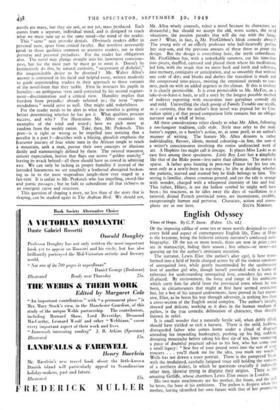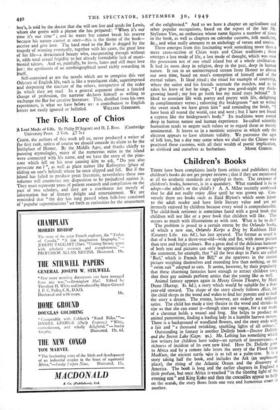English Odyssey
Time of Hope. By C. P. Snow. (Faber. 12s. 6d.)
OF the imposing edifice of some ten or more novels designed to cover every field and aspect of contemporary English life, Time of Hope is the keystone, being the hitherto reticent narrator's confessed auto- biography. Of the ten or more novels, three are now in print ; two are in manuscript, biding their season ; five others—or more—are queuing up for the author's imminent attention.
The narrator, Lewis Eliot (the author's alter ego), is here trans- formed into a field of battle charged across by all the violent emotions of unrequited love, while gently incommoded by the unobtrusive love of another girl who, though herself provided with a frame of reference for understanding unrequited love, considers his own as ill-placed. By environment, the force and range of his ambitions which carry him far afield from the provincial town where he was born, in circumstances that might at first have seemed restrictive but, for a boy of his natural endowments, have proved in fact expan- sive, Eliot, as he bores his way through adversity, is nothing less than a cross-section of the English social complex. The author's insight, shrewd and delicate, working as it does in the human medium of pathos, is the true comedic delineation of character, thus sharply thrown in relief.
It is small wonder that a naturally fertile soil, when deftly tilled, should have yielded so rich a harvest. There is the mild, feckless, disregarded father who comes home under a cloud of disgrace attending his impending bankruptcy, pushing up his big, reddish, drooping moustache before taking his first sip of tea, later• venturing a piece of doubtful practical advice to his boy, who has come into a small legacy: " Sew five of your pound notes into the scat of your trousers . . . you'll thank me for the idea, you mark my words. Wells has not drawn a truer portrait. There is the pampered Vicar with the modulated, carefully fatigued voice still holding the remaini of a northern dialect, in which he questions crucially if indirectly other men, likewise trying to disguise their origins. There is the amazing Getliffe, whose chambers Lewis Eliot enters in London.
His two main attachments are his mother, the fount, and the girl he loves, the bane of his ambitions. The pathos is deepest when the mother, having identified her own future with that of her promisin4
boy's, Is told by the doctor that she will not live and sends for Lewis, whom she greets with a phrase she has prepared : " When it's our time it's our time " ; and he wants but cannot break his reserve because his nature cannot at once—this is the theme of the book—
receive and give love. The hard road to the Bar is dogged by the tragedy of winning eventually, together with his cases, the great love of his life—a deracinated beauty who, exasperating enough without it, adds total sexual frigidity to her already formidable lack of matri- tnonial talents. And so, painfully, he loves, hates and still must love Per : the apotheosis of an autobiographical novel richly rewarding in itself. Self-contained as are the novels which arc to comprise this vast Odyssey of English life, each is like a translucent slide, superimposed and deepening the tincture of the others, irrespective of the order In which they are read. In a general argument about a fancied change of profession, the narrator declares himself as willing to exchange the Bar for creative literature. This, distilled from his own















































 Previous page
Previous page